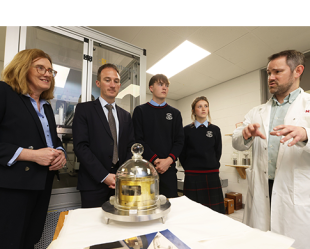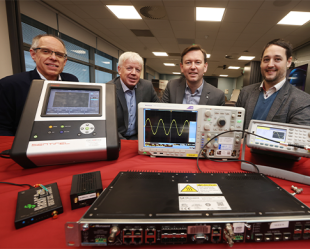Standardization for Societal and Citizen Security
Pictured above at inaugural meeting of Interest Group (l. to r.): Dr. Ian Cowan, NSAI; Mr. Tom Flynn, Saadian Technologies Ltd (Convener);
Mr. Dudley Dolan, Q-Validus Ltd, Nova, UCD; Mr. Stephen Purcell, Future Analytics Consulting.
September 12, 2014 | NSAI at its Dublin Headquarters holds inaugural meeting of Interest Group to co-ordinate national standardization for societal and citizen security
The area of societal and citizen security has become an increasingly important one for standardizers dealing with offsetting the types of threats to which modern society can be subject and the appropriate responses in the event of attack so as to minimize effects and facilitate business continuity. Technical committees have been established in both ISO and CEN to cover the area.
A number of collaborative research projects within the European Commission’s Seventh Framework and Horizon 2020 research programmes which include Irish participants have signalled the importance of standards development as a concomitant to research in order to facilitate development and workability of any innovative solutions; examples are:
COBACORE - COmmunity BAsed COmprehensive REcovery,
DESTRIERO - A DEcision Support Tool for Reconstruction and recovery and for the IntEroperability of international Relief units in case Of complex crises situations, including CBRN contamination risks,
S-HELP - Securing Health.Emergency.Learning.Planning – Development of Decision Support Tools for Improving Preparedness and Response of Health Services Involved in Emergency Situations, and
SECTOR - which addresses the area of a secure European common information space for interoperability of first responders and police authorities.
ISO/TC 223 – Societal security – develops international standards that aim to increase societal security, i.e. protection of society from and response to incidents, emergencies, and disasters caused by intentional and unintentional human acts, natural hazards, and technical failures. An all-hazards perspective is used covering adaptive, proactive and reactive strategies in all phases before, during, and after a disruptive incident.
The area of societal security is multi-disciplinary, and involves actors from both the public and private sectors, including not-for-profit organizations. Published standards are in the ISO 223XX series, in particular ISO 22300: 2012 on Terminology, and ISO 22301: 2012 on Business continuity management systems – Requirements.
ISO/TC 223 Working groups
The conveners for the following can be reached through the secretariat- ISO/TC 223/WG 1 Framework standard on societal security management
- ISO/TC 223/WG 2 Terminology
- ISO/TC 223/WG 3 Emergency management
- ISO/TC 223/WG 4 Resilience and continuity
- ISO/TC 223/AHG 4 Communication group
- ISO/TC 223/WG 6 Mass evacuation
CEN/TC 391 – Societal and citizen security – is working to elaborate a family of European standards, standard-like documents (e.g. procedures, guidelines, best practices, minimal codes of practice and similar recommendations) in the sector, including aspects of prevention, response, mitigation, continuity and recovery before, during, and after a destabilizing or disruptive event. Verification and training are also considered, and the committee identifies, as required, any needs in product standardization for progress by appropriate sectoral committees within ISO or CEN, or develops the standard(s) or proposed deliverables itself where no such sectoral committees exist.
Specifically, the following elements come within the committee’s scope: products and services (equipment, communication, information, goods, transport, energy, cultural inheritance and properties); infrastructures (roads, ports, airports, rail stations, bridges, factories, etc.); stakeholder needs and requirements, and potential conflicts; relationship (cultural and geographical diversity); and citizen requirements and vulnerabilities, including privacy. In addition to the transposition to ENs of ISO 22300 and 22301 (2014), TS 16595: 2013 – CBRN – Vulnerability assessment and protection of people at risk – has been published.
CEN/TC 391 Working groups
- CEN/TC 391/WG 1 Healthcare Facilities
- CEN/TC 391/WG 2 CBRNE
- CEN/TC 391/WG 3 Crisis management/civil protection
NSAI/ISO TC 223-CEN/TC 391/IG will participate in areas covered by the technical committees and nominate specialists, as appropriate, to their various working groups. Its activities will largely be conducted through electronic means and teleconference, though at least one face-to-face meeting per year will be held to ensure optimum co-ordination of national endeavours and input into the international and European work.
Further details are available from Dr. Ian Cowan | NSAI Standards | (01) 807 3876



